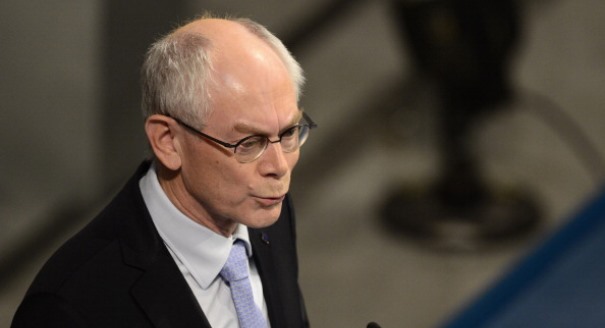Herman Van Rompuy always seems a bit awkward. Looking up owlishly from behind his spectacles, he even apologizes in case his arguments at times seem too intellectual. He was an internationally unremarkable prime minister of Belgium, though praised for his skill in finding compromises.
Yet the ideas that the outgoing president of the European Council put forward last weekend in Berlin were the most trenchant and eloquent that any EU leader has articulated in a long time. He spoke about truth and trust, about belief in Europe, and about what the words “space” and “place” might mean in a European context.
Such vocabulary doesn’t belong in Eurospeak, the lingo politicians and bureaucrats in Brussels have developed. All the more reason to listen carefully to what he had to say.
The occasion was the “State of Europe” speech, an annual event in Berlin that coincides with the anniversary of the collapse of the Berlin Wall on November 9, 1989. Van Rompuy, speaking in the modern Allianz Forum building, a stone’s throw from the eighteenth-century Brandenburg Gate, has no illusions about what that dramatic night meant for Germany, and for Europe.
“The fall of the Berlin Wall closed the postwar period,” he told his audience. “It opened the ‘post-wall’ period. And we in Europe are still in it today.” Europe, Van Rompuy believes, has yet to become integrated, to become what he calls a place—a home.
Former German chancellor Helmut Kohl saw the collapse of the wall and the reunification of Germany as powerful reasons to push forward with European integration. He knew there are moments in history that have to be seized.
For the sake of European integration, Kohl gave up his country’s cherished deutsche mark. He pushed for a common foreign and security policy. And he staunchly supported EU enlargement to Eastern Europe, because that meant bringing the citizens from that part of the continent back home.
Looking back, the early 1990s were a revolutionary period. The “big bang” enlargement of 2004 happened because belief in Europe was still strong and optimistic.
But Van Rompuy believes that Europe’s unification is unfinished. Over the years, Europe has been turned into a space “allowing goods, services, and capital to circulate freely, allowing persons to travel freely,” he said in Berlin. But, he added, “much less attention has been paid to Europe as a place.”
“For Europe to become a place, to feel more like a home, our union must be able, if not to protect people, at the very least to respect the places of protection and belonging,” the European Council president went on.
But Europe is not moving toward being a place. EU leaders are not prepared to tell the truth about how their citizens have to live and cope with globalization and the aftermath of the euro crisis. It is becoming harder to find a job or hold on to one. The old days of certainty are over. As Van Rompuy said, certainty is being replaced by disorientation, anger, or angst.
These problems provide wonderful fodder for populists. “Populism [is] an outlet for anger and resentment, the promise of a restored identity, the illusion that closing a fence can turn back the clock,” as Van Rompuy put it.
Under the influence of these populists, leaders have stopped Europe from being a place of protection. Just consider how Europe treats Syrian refugees. Over the past two years, the EU’s 28 member states have given shelter to a grand total of 40,000 Syrian exiles, compared with the two million who are being accommodated in Jordan, Lebanon, and Turkey.
Van Rompuy would clearly like European leaders to explain to their citizens that there are no quick fixes. That closing borders or restoring national currencies are not solutions. That creating yet another financial instrument is not an answer. That putting off reforms would make matters worse. That blaming Europe is dishonest. Above all, those leaders who pretend that their countries can succeed on their own are selling illusions.
Van Rompuy’s speech is a reminder of the power of the intellectual and the power of truth. His words are also a reminder of just how remote the European Commission has become. Obsessed by process, the commission still regards itself as the guardian of integration. Yet far too often, its lack of legitimacy and its tenured bureaucrats, who seem incapable of communicating simply, give integration a bad name. As for national leaders, so often they seek political longevity at the expense of long-term policy.
One might wonder why it has taken this Belgian politician, a member of the circle of leaders that he is blaming, to point out these ills. Yet that doesn’t take away from the fact that Herman Van Rompuy, president of the European Council, is one of the few people in Brussels who seem to have understood where Europe has gone wrong.






.jpg)